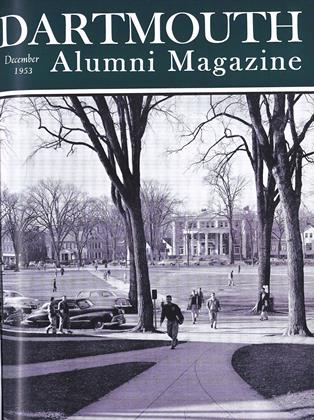At last report the Indians had dropped all of their first four games Holy Cross, Navy, Army and Colgate and a barrage of alumni criticism had already been loosed. In the next four games Harvard, Yale, Columbia and Cornell Dartmouth managed to win only one contest, but the quality of play in these Ivy games, the improvement in the Big Green offense, and the team's spirit in the face of heartbreaking defeats must give pause to any detractors of Dartmouth football in 1953.
Let it be recorded that the 1953 team will go down in the record books as the best passing team in the 73 years of Dartmouth football. In eight games to date the Big Green has completed 83 out of 164 passes for a gain of 1,347 yards and 13 touchdowns. The previous record for team passing (78 out of 146 passes for 1,025 yards and 11 TD's) was held by the 1949 team. At present Dartmouth ranks third in the nation in passing offense behind Stanford and Washington. Dartmouth's passing in the last four games against Ivy opponents has been mainly responsible for the new record. In these contests the Indians have tossed an average of 24 passes, gained 222 yards and scored three touchdowns per game. A new team pass-receiving average was also set on the basis o£ the above figures, although the record of 13 touchdowns through the air has been surpassed by the 1925 team which made 17 aerial scores during their undefeated season.
The new passing and receiving records are due primarily to four players sophomore quarterbacks Bill Beagle and Leo McKenna and senior ends Dave McLaughlin and Dave Thielscher. Beagle and McKenna, who have alternated at quarterback for the Big Green, have almost identical passing averages, with Beagle completing 37 of 72 passes for 635 yards and nine touchdowns, and McKenna hitting 37 out of 71 passes for 556 yards and three scores. Dave McLaughlin, left end, has caught 28 passes for 495 yards and six scores and ranks fifth in the nation in this department; while right end Dave Thielscher has 20 catches for 267 yards and two TD's. Thielscher's and McLaughlin's combined catches establish them as the best pair of ends in Dartmouth football history, as they have bettered the Rowe-Beeman record set in 1949 (58 catches for 748 yards and eight scores). McLaughlin, with six touchdown passes, can also duplicate or better Rowe's feat of snagging seven scoring passes in one season (1948), while sophomore passing ace Bill Beagle, who has tossed nine touchdown passes, can tie or better Johnny Clayton's record of heaving ten scoring passes in one season. However, the 1925 individual records (Oberlander threw 14 scoring passes, Myles Lane caught eight touchdown passes, George Tully seven) will probably still stand at least for one more season.
While the Dartmouth passing attack was certainly impressive, the Big Green running attack was nowhere near as potent and this, along with an erratic defense, has meant the difference between victory and defeat in most games. Lou Turner, brilliant halfback, paced the Indian ground attack with 73 carries for 341 yards and a 4.7-yard average. Fullback Dick Jennison was averaging 3.6 yards per carry on 48 attempts, while the other regular halfback _ Jim Donohue - had picked up 78 yards on 32 rushes and Jack Nicolette, a promising sophomore, had the best average of all gaining 61 yards in 12 attempts for a 5yard average.
HE CAUGHT IT: Dave Thielscher, Dartmouth's glue-fingered end, about to make a diving catch in the end zone for one of the four touchdowns the Big Green scored against Cornell in Hanover.
 View Full Issue
View Full Issue
More From This Issue
-
 Article
ArticleBIGNESS
December 1953 By DAVID E. LILIENTHAL -
 Article
ArticleCharles Ransom Miller '72
December 1953 By JOHN HURD '21 -
 Class Notes
Class Notes1918
December 1953 By ERNEST H. EARLEY, w. CURTIS GLOVER, RICHARD P. WHITE -
 Class Notes
Class Notes1935
December 1953 By HENRY R. BANKART, JOHN WALLACE -
 Class Notes
Class Notes1931
December 1953 By Lambert & Feasley, Inc., PETER B. EVANS, CHARLES S. MCALLISTER -
 Article
ArticleA True Dog Story
December 1953 By A. I. Dickerson
Cliff Jordan '45
-
 Sports
SportsFootball
October 1952 By Cliff Jordan '45 -
 Sports
SportsWith Big Qreen Teams
April 1953 By Cliff Jordan '45 -
 Sports
SportsMay Schedules
May 1953 By Cliff Jordan '45 -
 Article
ArticleBaseball
May 1954 By CLIFF JORDAN '45 -
 Article
ArticleDartmouth 32, Cornell 15
DECEMBER 1958 By CLIFF JORDAN '45 -
 Article
ArticleFreshman Sports
November 1959 By CLIFF JORDAN '45








